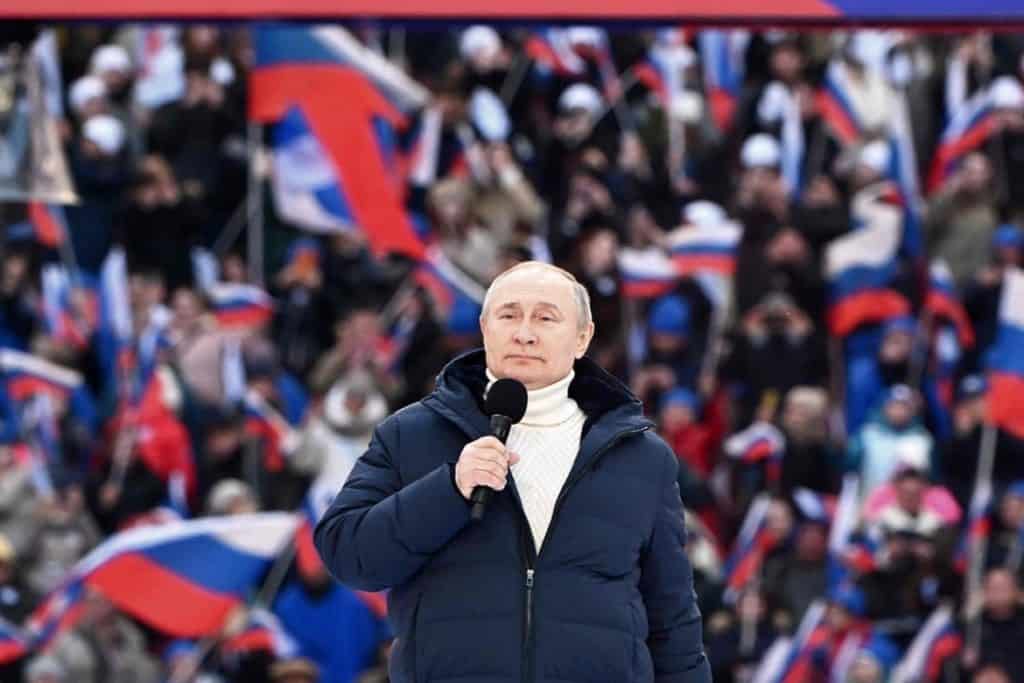By Nikola Mikovic
Moscow and Kyiv are reportedly aligned on Ukraine’s neutrality and giving up on joining NATO, but Russian and Ukrainian negotiators are still far from signing a ceasefire deal. The status of Crimea and the Donbass is something that they can hardly agree on any time soon, if at all.

Ukraine, firmly backed by the West, will never recognize Moscow’s incorporation of Crimea into the Russian Federation in 2014. Moreover, Kyiv will never recognize the Russia-backed self-proclaimed Donetsk People’s Republic and Lugansk People’s Republic. For the Kremlin, the only way to force Ukraine to give up Crimea and the Donbas is to install a pro-Russian government in Kyiv that will de facto or de jure agree that the two regions are no longer part of Ukraine. But Moscow insists that it does not intend to force a regime change in the Eastern European country.
Political goals of Russia’s “special military operation” in Ukraine are somewhat unclear. As Russian President Vladimir Putin stressed during his “historic speech” on February 24, Moscow will pursue demilitarization and denazification of Ukraine, as well as bringing to justice those who committed numerous bloody crimes against civilians, including citizens of the Russian Federation. Implementing such goals is unlikely possible without overthrowing the current government of Ukraine. But for Moscow, Ukraine’s President Volodymyr Zelensly is a legitimate leader of the country. Thus, the very implementation of Russian political goals will be rather difficult.
To this day, Russia has not achieved its military goals either. If the purpose of the intervention was to demilitarize the Eastern European nation, it remains unclear why Russian forces have not launched its operation from southwestern Belarus and focused on establishing control over Ukraine’s border with NATO members Poland, Slovakia and Hungary. As long as Ukraine’s western borders are open, the country will continue to receive weapons from the West, and Russian troops in the east will have a hard time seizing strategically important cities.
Russia, however, managed to resolve the issue of water supplies to Crimea. Now that Russian troops control southern Ukraine, the disputed peninsula can receive water from the Dnieper River via the North Crimean Canal that has been blocked since 2014.
“Crimea had to be rescued from the abject state that it faced before reuniting with Russia”, Putin told a gala concert at Moscow’s Luzhniki Stadium on March 18, marking the eight anniversary of Moscow’s incorporation of Crimea into the Russian Federation.
According to reports, over 200,000 people attended the concert, which suggests that vast segments of the Russian society overwhelmingly support the current status of Crimea. Recent polls have shown that 68 percent of Russians also support Moscow’s “special military operation” in Ukraine, while Putin’s approval ratings remain very high – 71 percent. However, if Russia does not achieve its proclaimed political and military goals in Ukraine, Putin’s popularity could start declining. More importantly, without significant advances on the ground, Moscow will unlikely be able to negotiate with Kyiv from a sufficient position of strength.
As Putin stressed, the main goal of Russia’s military operation in the Donbass is to “liberate people from suffering and genocide”. The United States, on the other hand, insists that Putin used “false genocide claims as pretext for invasion of Ukraine”, even though Washington and its Western allies used alleged Serbian massacre of ethnic Albanians in 1999 as a pretext for NATO bombing of Serbia. Moreover, the U.S. President Joe Biden called Putin “a war criminal”. The Kremlin’s response was rather weak.
“Bearing in mind Mr. Biden’s irritability, fatigue and forgetfulness, which eventually results in aggressive statements, we will possibly prefer to refrain from making any strong comments so as not to trigger more aggression”, said Putin’s spokesman Dmitry Peskov.
It is worth noting that in the past Biden called Putin a killer but that did not prevent him from holding several summits with the Russian leader. Therefore, despite harsh rhetoric, it is entirely possible that Russian and American presidents will eventually discuss the situation in Ukraine.
Meanwhile, Russia is expected to continue holding talks with Ukraine, although chances for a sustaining peace in the Eastern European country seem to be very slim. Unless Russian troops seize parts of the Donbass that are still under Ukrainian control, or possibly capture strategically important cities in the southeast of Ukraine, Kyiv is unlikely to make any significant concessions to Moscow. It is not very probable that Ukraine declaring no NATO membership will satisfy Russia. What the Kremlin needs is a victory, but given Russian troops’ very slow advancement, it may take months before Moscow achieves its military goals in Ukraine.
By the end of March, Russia-backed Donetsk People’s Republic forces may seize the port-city of Mariupol and get full control over the Sea of Azov, but such a development will not be a game changer in the conflict. Ukraine has made it very clear that it does not intend to give up fighting, and the West has no reasons to stop supplying Kyiv with weapons. Thus, Russia is not in an easy position. Quite aware of that, Kyiv is unlikely to rush signing a ceasefire deal with Moscow, which means that the scale of destruction, as well as the number of casualties in the Russo-Ukrainian war, will continue to grow.
Author: Nikola Mikovic (Journalist, researcher and analyst based in Serbia. He covers mostly the foreign policies of Russia, Belarus and Ukraine)
(The views expressed in this article belong only to the author and do not necessarily reflect the views of World Geostrategic Insights).







